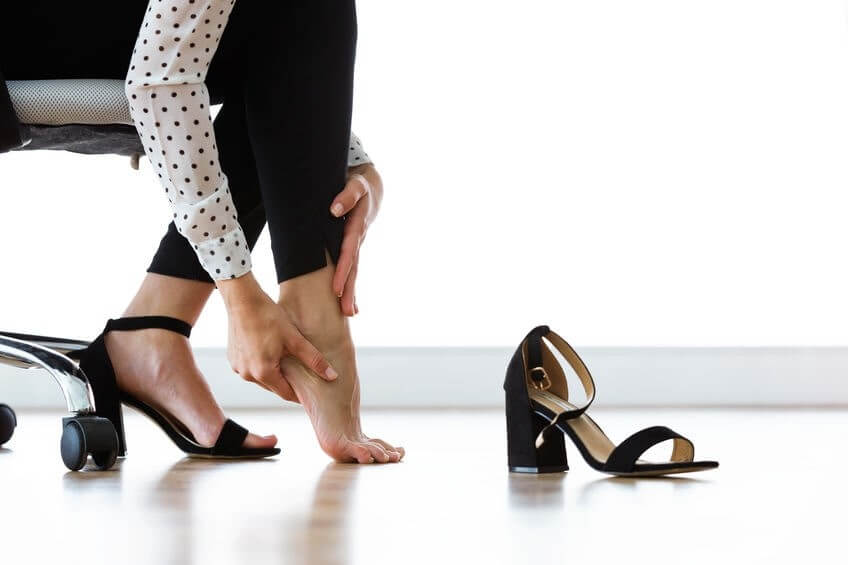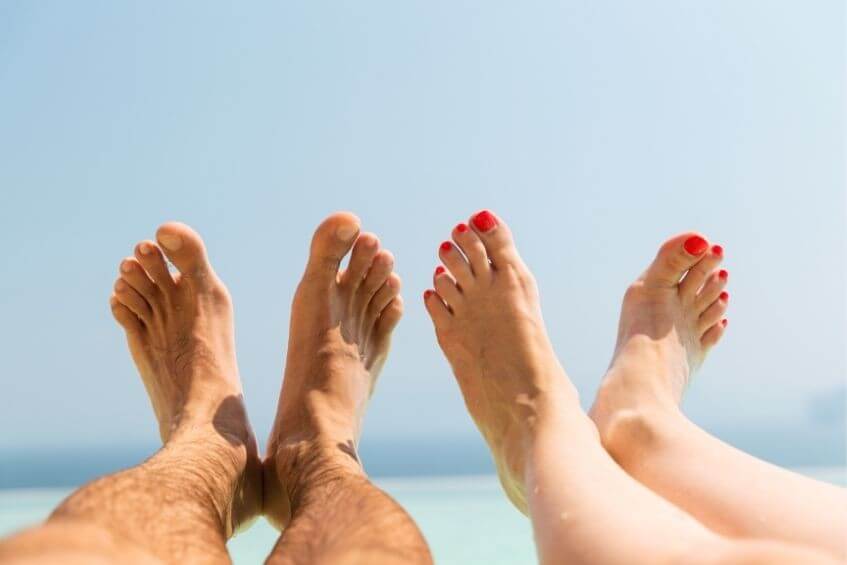.png)
Jump to section
Medically known as tinea pedis, athlete’s foot is a fungal skin infection that presents on the bottom of the feet and between
the toes. It affects the superficial (outer) skin layer and can cause itching, blistering, scaling plaques and cracks in the skin which can
become painful and inflamed.
The name ‘Athlete’s foot’ was coined from an increased prevalence of this condition in athletes. This is because
regular use of enclosed shoes that can become hot and sweaty during exercise is the ideal environment for fungus to thrive. Athlete’s
foot can affect anyone that comes in contact with the fungus, even if they rarely exercise. It also often affects people who have sweaty
feet confined within tight fitting shoes or spend time in public amenities e.g. swimming pools.
Many people will experience an Athlete’s foot infection at some point in their lives, or even many times, as it is relatively easily spread through sharing surfaces like showers and changing rooms. This occurs because fungal infections spread through spores that are very small, lightweight, and are left on surfaces that a bare foot can easily come into contact with in these areas. These spores are invisible to the naked eye - with more than 1,000 spores easily fitting on a small pinhead. Once you’re exposed to the fungus, anyone can develop the infection - although being exposed doesn’t guarantee that the fungus will take hold and affect your skin.
A number of different types of fungus can be responsible for an Athlete’s foot infection, the most common being called trichophyton.
This fungus is found in warm and damp environments, which provides the ideal conditions for fungus to multiply quickly and
spread. For this reason, Athlete’s foot is often contracted from communal showers, changing rooms, pool areas and the like.
Sweaty and damp gym shoes also make a perfect breeding ground for this fungus, which is why Athlete’s foot tends to be more prevalent among athletic individuals. With that said, sandal wearers have an increased risk too, with the hot sun drying the skin so it loses its natural protective oils, and with the potential rubbing and friction from wearing the sandals making you more prone to infection.
Athlete's Foot can be acquired at all ages and ethnicities, however are more often present in men rather than women and in adults more so than children.
Although being common in such a diverse group, there are certain risk factors that heighten your chance of acquiring it. These include:
The early signs and symptoms of Athlete's foot include:
This infection will often start on or between your toes, spread further down to the soles of your feet, and may even spread to your hand, especially if you're constantly scratching at the infected parts of your feet.
As fungus is persistent, an Athlete’s foot infection doesn’t tend to go away on its own. We highly recommend starting treatment as early as possible if you suspect that you have an Athlete’s foot fungal infection.
Our qualified podiatrists will perform a physical examination and a range of other tests, to assess whether a fungal infection is present.
It's important to rule out other skin conditions, and also determine whether a fungal infection is present alone, or if a fungal and
bacterial infection are present. If both are present, a different method of treatment is required, so it's important that we get a confident
diagnosis from the start.
Once your Athlete's Foot infection is confirmed, we’ll go through your treatment options, including all the precautions and preventive measures we recommend you take to help you get your infection under control and keep it from coming back. We recommend:
These recommendations will be coupled with either an over-the-counter antifungal medication for mild Athlete's Foot or prescribed medications for more severe conditions. As there are a range of anti-fungal options including ointments, creams, powders and sprays, we recommend you seek advice from your podiatrist on what the best treatment course would be for you.
As an Athlete’s foot infection is contagious, if you notice a change in your skin around your toes and experience any of the signs & symptoms listed above, we recommend seeking treatment immediately before it becomes a stubborn fungal skin infection.

f you are injured and experiencing heel pain, the first thing you should do is look at your activity levels and modify them if needed.
Follow these three simple rules to help manage your heel pain

Not everyone needs orthotics, but they can play an integral role in treating or relieving pain in several foot and lower limb conditions.

The heat and humidity of an Australian summer makes it a prime time for issues to arise, so our newest podiatrist Lucy has put together
seven helpful tips to keep your feet healthy and problem free throughout summer.
| Monday | 7:40am - 6:00pm |
| Tuesday | 7:40am - 6:00pm |
| Wednesday | 7:40am - 6:00pm |
| Thursday |
7:40am - 6:00pm |
| Friday | TEMP CLOSED |
| Saturday | CLOSED |
| Sunday | CLOSED |
Ground Floor, 344 Queen Street,
Brisbane City QLD 4000
| Monday | 7:40am - 6:00pm |
| Tuesday | 7:40am - 6:00pm |
| Wednesday | 7:40am - 6:00pm |
| Thursday |
7:40am - 6:30pm |
| Friday | 7:40am - 5:00pm |
| Saturday | 7:40am - 4:30pm |
| Sunday | CLOSED |
Newmarket Village, 114/400 Newmarket Rd, Newmarket QLD 4051